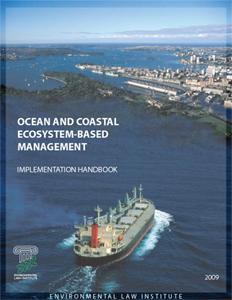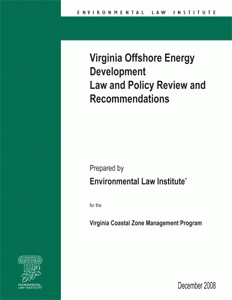Marine Spatial Planning in US Waters: An Assessment and Analysis of Existing Legal Mechanisms, Anticipated Barriers, and Future Opportunities

Marine spatial planning (MSP) has gained increasing international attention as a tool for implementing ecosystem-based management, reducing user conflicts, and ensuring the sustainable use of ocean and coastal resources. While the President’s Interagency Ocean Policy Task Force developed recommendations for a federal MSP framework, the Environmental Law Institute and Ocean Conservancy have released a report, Marine Spatial Planning in US Waters, that reviews federal ocean and coastal laws, identifying the obstacles and opportunities they present for federal MSP.
Ocean and Coastal Ecosystem-Based Management: Implementation Handbook

With support from the David and Lucile Packard Foundation and input from many ocean and coastal management experts, the Environmental Law Institute produced this Handbook to identify successful approaches to implementing marine ecosystem-based management (EBM), describe their limitations, and highlight opportunities to apply them in the future. This Handbook provides a spectrum of examples that take steps toward EBM. It is designed to share a variety of approaches that may be useful in different settings depending upon regional needs and opportunities.
Virginia Offshore Energy Development Law and Policy Review and Recommendations

Virginia is facing various forms of energy development activities offshore and in the territorial waters of the Commonwealth. These include possible proposals for wind and wave energy, liquefied natural gas transport, and natural gas drilling on the outer continental shelf, among others. State laws and policies must deal with these activities and their anticipated impacts. Virginia’s Coastal Zone Management Program has provided support for this project by the Environmental Law Institute to examine the law and policy framework in place to deal with potential activities.
Ocean Program Editorial
Ocean Program Editorial
Seven
July 8, 2013
I’ve been working on ocean issues for, not seven, but 20 years. While working on my degree in zoology, I dove into ocean research at a marine field station in Florida, studying molecular evolution in jellyfish. Hooked on the fabulous biodiversity of life at sea, I spent the next several years earning a PhD in marine biology.
Ocean Program
Our oceans act as a crucial life-support system for the planet and its inhabitants — soaking up carbon dioxide from the atmosphere, providing a wealth of natural resources, nurturing incredible and mysterious sea creatures, and serving as a playground and place of cultural heritage. Covering 71 percent of Earth’s surface and providing 99 percent of its living space, the ocean often seems invincible. Yet human activity threatens to diminish the myriad services that the ocean provides.
